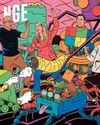
WHEN ALEKSANDR ZHUKOV went on trial last year, he stood accused of defrauding US companies, including The New York Times and pet care brand Purina, out of millions of dollars. According to the US Attorney's Office, the then 41-year-old Russian set up a company that promised to show online advertisements to humans and instead placed those ads on an elaborate network of fake websites where they were seen only by bots. But his defense did not center around rejecting those claims or demonstrating remorse. Rather, Zhukov said he was giving the online economy exactly what it wanted: cheap traffic, whatever the source.
"There was nothing to conceal," he said on the stand in May 2021. "We were making business. We are not making scam or fraud."
A federal jury in Brooklyn disagreed, and in November 2021, Zhukov was sentenced to 10 years in prison. By extraditing him from Bulgaria, the US justice system sent a message that this type of crime has consequences. Yet Zhukov's testimony highlights an uncomfortable truth: The online economy is often willing to look the other way while bots distort it and line the pockets of cybercriminals.
Bots are polluting the internet. Fake users make up as much as 40 percent of all web traffic, according to some estimates. Researchers specializing in advertising fraud describe a Kafkaesque system in which businesses pay millions to advertise to humans but end up advertising to bots. Yet the digital advertising industry has grown so accustomed to working with bot-inflated numbers that few are willing to unmask the fake clicks powering much of the online economy.
Bu hikaye WIRED dergisinin December 2022 - January 2023 sayısından alınmıştır.
Start your 7-day Magzter GOLD free trial to access thousands of curated premium stories, and 9,000+ magazines and newspapers.
Already a subscriber ? Giriş Yap
Bu hikaye WIRED dergisinin December 2022 - January 2023 sayısından alınmıştır.
Start your 7-day Magzter GOLD free trial to access thousands of curated premium stories, and 9,000+ magazines and newspapers.
Already a subscriber? Giriş Yap

MOVE SLOWLY AND BUILD THINGS
EVERYTHING DEPENDS ON MICROCHIPS-WHICH MEANS TOO MUCH DEPENDS ON TAIWAN. TO REBUILD CHIP MANUFACTURING AT HOME, THE U.S. IS BETTING BIG ON AN AGING TECH GIANT. BUT AS MONEY AND COLOSSAL INFRASTRUCTURE FLOW INTO OHIO, DOES TOO MUCH DEPEND ON INTEL?

FOLLOW THAT CAR
CHASING A ROBOTAXI FOR HOURS AND HOURS IS WEIRD AND REVELATORY, AND BORING, AND JEALOUSY-INDUCING. BUT THE DRIVERLESS WORLD IS COMING FOR ALL OF US. SO GET IN AND BUCKLE UP.

REVENGE OF THE SOFTIES
FOR YEARS, PEOPLE COUNTED MICROSOFT OUT. THEN SATYA NADELLA TOOK CONTROL. AS THE COMPANY TURNS 50, IT'S MORE RELEVANT-AND SCARIER-THAN EVER.

THE NEW COLD WARRIOR
CHINA IS RACING TO UNSEAT THE UNITED STATES AS THE WORLD'S TECHNOLOGICAL SUPERPOWER

CALIFORNIA DREAMIN'
KINDRED MOTORWORKS VW BUS - Despite being German, the VW T1 Microbus is as Californian as the Grateful Dead.

THE INSIDE SCOOP ON DESSERT TECH
A lab in Denmark works to make the perfect ice cream. Bring on the fava beans?

CONFESSIONS OF A HINGE POWER DATER
BY HIS OWN estimation, JB averages about three dates a week. \"It's gonna sound wild,\" he confesses, \"but I've probably been on close to 200 dates in the last year and a half.\"

THE WATCHFUL INTELLIGENCE OF TIM COOK
APPLE INTELLIGENCE IS NOT A PLAY ON \"AI,\" THE CEO INSISTS. BUT IT IS HIS PLAY FOR RELEVANCE IN ALL AREAS, FROM EMAIL AUTO-COMPLETES TO APPS THAT SAVE LIVES.

COPYCATS (AND DOGS)
Nine years ago, a pair of freshly weaned British longhair kittens boarded a private plane in Virginia and flew to their new home in Europe.

STAR POWER
The spirit of Silicon Valley lives onat this nuclear fusion facility's insane, top-secret opening ceremony.